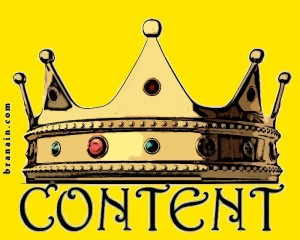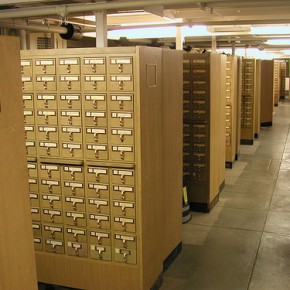Before the Internet, creating content was a respectable business. In the old days, you might be a content creator if you (there will be a quiz at the end, so pay attention) …
- Had an idea about how world worked, like why the finches on the Galapagos Islands have so many different beak shapes.
- Thought everyone should be treated fairly, regardless of their background, and wanted to share this novel idea with the world.
- Wanted to explore the ironies of life through the eyes of a young artist.
In recent years, though, the respectability of creating content has dropped, falling somewhere below selling organs on the open market. This drastic change happened around the time that businesses became fixated on having their website content show up on the much-coveted “First Page” of Google search rankings. Or when they became singularly obsessed with convincing people to click on their website ads.
This overemphasis on search ratings or ad clicks led to several painful things (especially if you are a content creator):
- The development of devious Black Hat tricks (think Voldemort of the marketing schools), such as using computers or minimally-paid workers to boost your search rankings.
- The creation of content mills, a tenuous network of starving writers churning out articles for pennies, largely accomplished through poor writing and blatant self-plagiarism.
- The Fall of the King (creating content) from the throne.
You’ve probably seen the result. Hundreds of poorly-designed websites, filled with bad (aka “crappy”) content, mucking up the Google searches, and making the Internet an all-around useless ecosystem. The situation is so terrible that you would often get better search results by flipping through a card catalog at your local library, rather than wading through all of the Internet noise.
Creating Content Is Back on the Throne
 Thankfully, this situation is slowly changing. No one likes bad content. You realize this, reputable companies realize this, and (finally!) Google has realized this. There are several reasons that creating content is once again King:
Thankfully, this situation is slowly changing. No one likes bad content. You realize this, reputable companies realize this, and (finally!) Google has realized this. There are several reasons that creating content is once again King:
- Content drives the Internet. Imagine what the Internet would look like without articles, funny videos on YouTube, or pictures of cats doing crazy things (shared on Facebook, of course).
- Google’s Penguin update shot a search algorithm volley across the bows of content mills everywhere. It’s clear that if you want to stay on top of the search rankings, you will need great, original content. [Google’s also been playing with ranking authors, which could make it even easier for you to find great content.]
- Content provides your readers value. If you can’t provide something of value to your customers, maybe you shouldn’t be in business (this also goes for non-profits). And no … having lots of ads for people to click on (most likely to get away from the horrible content on your website) is not valuable.
- Content introduces people to your business. What better way to build trust or showcase your expertise than by creating content that’s interesting and educational?
Now that the King is back, what’s the next stage in creating content for websites? You can approach content creation in any number of ways, but one approach that is rapidly growing is content marketing. Rather than always selling your content, you give some of your best content away for free. Yes … for FREE! It’s really not as crazy as it sounds.
If you want to learn more, check out my next post, “It’s a Free, Free, Free World: Why Content Marketing Equals Great Content.”
_____
Quiz Answers
The great content creators that I mentioned at the beginning of the post were:
- Charles Darwin, author of On the Origin of the Species, an informative description of how evolution shaped species, like the many varieties of finches on the Galapagos Islands.
- Thomas Jefferson, author of the Declaration of Independence, a great piece of content that not only went through many stages of revision, but was also given to the country for free.
- James Joyce, author of The Portrait of the Artist as a Young Man, amazing content that, although it confused many readers, still remains valuable today.
Photos:
University of Michigan Library Card Catalog by dfulmer / CC BY








